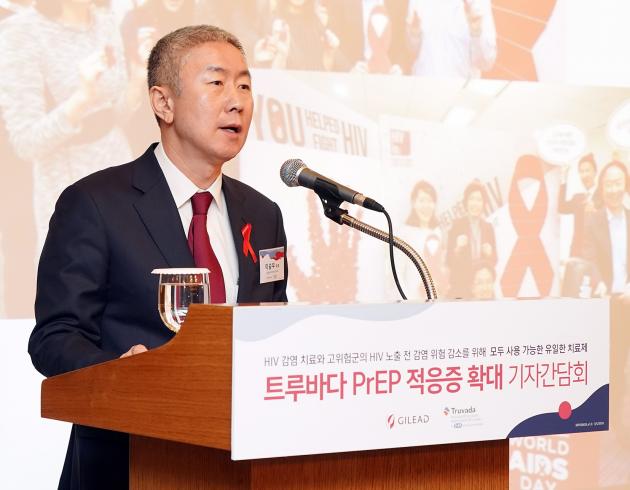Gilead Sciences’ HIV-preventing therapy Truvada will cost about 400,000 won ($374) a month, and piling on consultation and treatment fees will likely rack up the medical bill to $5,000 a year, industry sources say.
The Ministry of Food and Drug Safety on Feb. 13 granted expanded approval for Truvada (emtricitabine/tenofovir disoproxil fumarate) as pre-exposure prophylaxis (PrEP) therapy to prevent the risk of HIV-1 infection among high-risk populations such as gays or people whose partners are HIV-1 positive.
■ Related : Gilead Sciences Korea gets expanded the indication for Truvada to prevent HIV
That’s good news for Koreans considering the rapid rise of infections in recent years. Now in step with the 90-90-90 program to eliminate AIDS, Truvada can be used to slash the risk of new HIV infection by around 90 percent if taken continuously and in combination with other safe sex practices such as the use of condoms. In places like San Francisco, the number of new patients dropped by almost 50 percent.
■ Related : Where does Korea stand in ‘90-90-90’ program to eliminate AIDS?
“Gilead has the same goal as the World Health Organization’s 90-90-90 program,” said Paul Lee, general manager of Gilead Sciences Korea. “We will not stop just at developing therapies but work to reduce the disease by developing therapies that can prevent, treat, and finally cure the disease.”

Governments worldwide, including those of Norway, Kenya, Brazil, France, and most recently, New Zealand, rolled out aggressive national programs that provide Truvada wholly free or at a nominal price.
In Korea, however, government backing is not yet a reality. Gilead Sciences Korea still has a long way to go in getting reimbursement and getting the therapy into the hands of those who need it the most. A company official noted that the company is working with regulatory and health agencies to obtain public coverage.
“It’s still in the early stages. We are working with the KCDC and medical societies, but it’s still too early to say,” said Jeong Yeon-sim, director of regulatory and market access at Gilead Sciences Korea.
In the meantime, individuals without an HIV infection can get the drug at around 400,000 won a month. How many will be able to afford it remains a crucial question, though. Among HIV-positive individuals, poverty is an essential issue where half of the surveyed were found to be working irregular jobs or not working at all, according to UNAIDS. Around 40 percent of total respondents said they lived on less than the minimum household income of 1 million won ($875) a month.
“Considering the economy right now, paying around $400 a month for Truvada will highly likely be a financial burden for most,” said Professor Shin Hyoung-shik from the National Medical Center’s department of infectious disease and head of the Korean Society for AIDS, calling for the government to play a more supportive role.
Aside from the drug cost, Gilead will also have to deal with low trust in the confidentiality of medical records among Koreans. According to a Joint United Nations Program on HIV/AIDS (UNAIDS) report, only 27 percent of respondents said they were sure that medical records on HIV-infection were handled entirely confidentially, 53 percent were not sure, while 19 percent knew that confidential handling was not ensured. Around 17 percent said medical professionals disclosed their HIV status without their consent.
Despite the rising number of cases, HIV-positive individuals often face discrimination and are more vulnerable to depression and social isolation, according to UNAIDS data. Infected Koreans are also 10 times more likely to commit suicide compared to the general population, according to the National Human Rights Commission.

